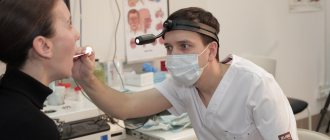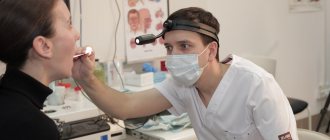Symptoms and treatment of allergic bronchitis in adults
Allergic bronchitis in adults and children develops as a result of contact with an allergen, which, once in the body, provokes an inadequate immune response of the defense system. Under the influence of an irritating factor, nerve endings are excited, blood tissues expand, muscles contract, which is accompanied by a strong, dry cough, profuse lacrimation, and a disturbance in general well-being.
In order for the treatment of allergic bronchitis in children and adults to be effective and the disease not to recur, it is first necessary to determine the source of the irritation. To do this, you need to consult an allergist who, based on the results of a comprehensive diagnostic examination, will identify the allergen, prescribe treatment and a special diet. It will not be possible to completely get rid of the disease, therefore, in the presence of predisposing factors, bronchitis of an allergic nature will worsen.
Allergens (environmental antibodies) as a cause of cough
Yes, an “excessive” response of the immune system to plant pollen and household dust causes inflammation of the pharynx, larynx, and nasal cavity, that is, an allergic cough.
Sometimes it provokes inflammation of the lower respiratory tract: the bronchi narrow, and attacks of suffocation appear. Asthma develops. The disease is more common in children, since their immune system has not yet developed. Therefore, it is important to diagnose an allergic cough in a child in time: treatment started in a timely manner helps to avoid asthma.
Urbanization and a “fast” lifestyle are the main factors contributing to the increase in the incidence of allergies. The artificial world created by man is saturated with all kinds of allergens. Metal particles invisible to the eye in city air, food dyes, feather pillows - all these are potential allergens.
Many people attribute the cough to an infection. But the characteristic symptoms indicate an allergic cough, the treatment of which requires a different approach. In the allergology department of the SANMEDEXPERT clinic, the exact cause of cough is determined and effective treatment is carried out.
Predisposing factors
Allergic bronchitis, the symptoms of which in adults and children are almost identical, usually proceeds according to a certain pattern. Penetration of a foreign allergen protein into the body provokes an inadequate immune response, which is manifested by profuse lacrimation, sneezing, and coughing. If the irritant is not promptly eliminated and the symptoms progress, reserve protection is activated, accompanied by hyperspasm of the bronchial tree and swelling of the ciliated mucosa that lines the internal respiratory organs.
As a result of constant irritation, the lung tissue begins to produce thick mucus, which gradually accumulates in the alveoli and becomes a source of bacterial infection. Stagnation and infection of mucus in the bronchi is the main cause of allergic bronchitis.
If a person has a strong immune system and good health, infection of bronchial tissues rarely occurs. The defense system quickly destroys the infection, preventing it from actively multiplying and spreading to healthy structures. But if the immune system is weakened and a person is prone to allergies, then under the influence of predisposing factors the risk of developing allergic bronchitis increases significantly.
Reasons that provoke the development of bronchitis of an allergic nature:
- abuse of bad habits;
- congenital or acquired immunodeficiency;
- unbalanced diet;
- passive smoking;
- living in an unfavorable environmental environment;
- uncontrolled use of drugs;
- lack of competent treatment for allergic diseases;
- inactive lifestyle;
- use of bedding with natural fillings: down, feathers;
- work with industrial hazards, involving constant contact with chemical or organic substances.
For a long time, the immune system can suppress a foreign irritant that regularly penetrates the body, so a person will not suspect a tendency to allergies. But at a certain point, all the predisposing factors converge at one point, as a result of which a serious disease begins to progress sharply, the consequences of which sometimes have to be fought throughout life.
Can allergies cause coughing?
07.10.2021
It doesn't matter what the reason is, but a cough, loud, unpleasant, is always annoying and constantly attracts unwanted attention. But what is really behind this cough? Could allergies be causing your cough, or is it just a common cold? It turns out there are some pretty clear differences between coughing due to allergies and coughing during a cold.
Why do we cough?
The purpose of coughing is to help us. This is our body's attempt to get rid of something that the body perceives as a threat in the respiratory tract. These perceived threats could be anything: a piece of food stuck in the throat , pollen, swelling , or drainage from mucus in the throat . All this irritates the sensitive fibers of the respiratory tract, which stimulates coughing.
What exactly happens in our body during a cough? This is quite a complex process. In general terms, our vocal cords close briefly to create pressure in the lungs . Once the pressure gets high enough, the vocal cords open again and air quickly passes through the vocal cords, creating that coughing sound .
Can allergies cause coughing?
Yes. Allergies usually cause a dry cough. This is a direct reaction to the fact that you have sensitive airways. If so, you will likely have other symptoms (itchy, watery eyes ; runny nose ; itchy throat ; sneezing). Time is also a significant factor. For example, if you're allergic to pollen (or an adorable new kitten), you'll likely notice symptoms (including coughing) almost immediately or within an hour of the allergic reaction . And these symptoms can last for hours after you're exposed, even after the allergen is no longer around.
Allergy- related coughs also depend on the cause, so doctors always try to look at the big picture. Let's say you have a cough every March. This may be a sign that you are suffering from allergies rather than a cold. Your best defense against allergy : antihistamines, which are available over the counter. Other options include steroid nasal sprays and immunotherapy, which can go beyond just relieving symptoms and regulate your body's response to allergens .
How can you tell if a cough is caused by a cold?
Is an allergic cough usually drier? A cough from a cold (or flu), on the other hand, is often wet (this “wetness” is actually mucus that your body is trying to expel). Coughing during a cold is usually accompanied by nasal , as well as mucus in the airways, which can cause a sore throat or chest . A cold does not “develop” as quickly as an allergy . It should be noted, however, that a dry cough does not only occur during allergies , just as a wet cough is not always a consequence of a cold. For example, allergies may signal themselves through the nose , causing postnasal drip (wet cough), while mild colds may be too short-lived to produce phlegm.
Should you worry about a cough at all?
Remember something important: coughing, regardless of its cause, is not normal. Colds usually clear up within a few weeks, which means the cough associated with a cold should clear up in about three weeks. The length of an allergic cough depends on how you treat it, if at all.
But if you notice that you are still suffering from a cough after two months, see your doctor . You may be dealing with allergies that you don't know about, or potentially being susceptible to another condition such as asthma (especially if you notice shortness of breath with any of your symptoms), pneumonia , or bronchitis . And if something ( an allergy or an annoying cold) bothers you so much that you feel like it’s ruining your life, don’t put off visiting a specialist.
Published in Allergology Premium Clinic
How does the disease manifest itself?
Allergic bronchitis causes acute symptoms in adults, so it is better not to self-medicate and visit a doctor as soon as possible. After contact with an allergenic irritant, the following clinical picture develops:
- Dry, unproductive cough. As a result of irritation and swelling of the mucous membrane, a person suffers from a barking, scratchy, unproductive cough. Sputum does not come out well, sometimes there is none at all. The patient cannot cough well and feels discomfort in the chest. A dry cough can get worse at night, preventing a person from getting a good night's sleep and rest.
- Expiratory dyspnea. In the initial stages of development of bronchitis of an allergic nature, shortness of breath does not bother you. However, as mucus accumulates in the bronchi, breathing problems appear. The patient cannot take a full breath and complains of pain in the chest.
- Swelling of the mucous membrane. An allergen, having entered the body through the respiratory system, first of all causes irritation of the mucous membrane. Therefore, in addition to a dry cough, a person may be bothered by excessive lacrimation, runny nose, swelling of the nasopharynx, and allergic conjunctivitis.
Prolonged coughing attacks and breathing problems cause the development of non-specific symptoms:
- weakness, lethargy;
- headaches, dizziness;
- sore throat, hoarse voice.
On average, the exacerbation period lasts 3–4 days. After this, acute symptoms gradually disappear, and the disease goes into remission. Allergic bronchitis, which is not treated or treated incorrectly, can lead to the development of severe complications, such as:
- pneumonia;
- bronchial asthma;
- damage to the walls of the bronchi;
- pulmonary emphysema;
- respiratory, heart failure;
- embolism;
- pneumosclerosis.
Allergic cough
An allergic cough is not a disease, but only a specific manifestation of an allergy. This cough is called the “cough variant of bronchial asthma” and is a symptom of a general allergic disease. An allergic cough can occur when allergens affect the upper respiratory tract . This type of cough is directly related to inflammation in the bronchi, trachea and mucous membrane of the throat.
Video - diagnosis and treatment of allergies, 12:17 min
An allergic cough most often occurs in paroxysms, starting suddenly, a person literally coughs. Typically, an allergic cough lasts 14-21 days and is not accompanied by an increase in temperature, but can easily be accompanied by a runny nose. The cough appears mainly at night, and stops during the day. The cough is dry, but may be accompanied by sputum, which is clear and free of pus. An allergic cough may also be accompanied by an itchy throat, nose, or sneezing.
The causes of allergic cough are different and depend largely on the type of allergy . Most often, this is a typical allergy to dust, flowering plants (hay fever), animals, or the body’s reaction to a foreign protein that could be in the body with a vaccine, serum or plasma.
At President-Med clinics you can
- undergo examination and treatment in more than 30 medical specialties, rehabilitation after strokes, surgeries, injuries,
- pass various types of tests (more than 5,000 types of tests and laboratory tests),
- undergo functional diagnostics (ultrasound, endoscopy: gastroscopy), ECG, installation and interpretation of ABPM and Holter ECG and others,
- pass a medical examination in one day, undergo a medical examination (for both organizations and individuals), undergo a medical examination (for both organizations and individuals),
- obtain all kinds of certificates - certificates from the traffic police and for admission to sports, to purchase weapons, to a sanatorium,
- if there is evidence, issue a certificate of temporary incapacity for work,
- draw up and receive other types of medical documentation,
- make any injections,
- use the services of one-day surgery or day hospital.
Treatment of allergic bronchitis
Allergic bronchitis symptoms and treatment in adults is carried out after a comprehensive diagnostic examination. The diagnosis is made on the basis of an initial examination of the patient, a detailed study of the medical history, and laboratory and instrumental diagnostic examinations.
To identify the inflammatory process in the bronchi, the doctor gives directions for the following procedures:
- general blood analysis;
- bacteriological culture of sputum;
- chest x-ray;
- spirometry.
It is also important to identify the allergen, because without eliminating it, drug treatment will not bring the desired results and upon subsequent contact with the irritant, the disease will recur.
To identify the pathogen, the following procedures are prescribed:
- allergy tests;
- blood test for immunoglobulins;
- immunoblotting.
A person prone to allergic reactions must exclude from life all factors that provoke an acute immune response:
- dust;
- animals;
- clothes made from natural wool;
- bedding with fillings such as down and feathers;
- some products, for example, honey, citrus fruits, chocolate, etc.;
- aggressive hygiene and washing products;
- some medicines.
If the allergen is no longer present in a person's life, the risk of recurrence of allergic bronchitis will be minimized. To prevent exacerbations, it is important to follow the rules of a healthy lifestyle:
- give up bad habits such as alcohol, cigarettes;
- improve nutrition;
- give preference to active pastime to a sedentary lifestyle;
- undergo sanatorium-resort treatment once a year;
- eliminate the stress factor.
To relieve the pathological symptoms of bronchitis of an allergic nature, certain groups of medications are prescribed:
- Antihistamines. They block the histamine receptor, stopping the acute immune response to a foreign protein.
- Expectorants, mucolytics. The drugs dilute the secretion and accelerate its removal from the bronchi. Mucoltics are used to thin the cough, and after the cough becomes productive, the doctor prescribes expectorants. There are new generation medications that combine the effects of mucolytics and expectorants.
- Glucocorticoids. They are prescribed only in exceptional situations when attacks of allergic bronchitis cannot be controlled with the above medications. Drugs in this group have anti-inflammatory and antiallergic effects, help relieve swelling, and reduce vascular permeability. The course of therapy and dose are determined by the doctor individually. Including glucocorticosteroids into your treatment regimen on your own is fraught with negative consequences and complications.
- Sedatives. Some patients who have experienced attacks of allergic bronchitis are terrified of their recurrence. They are worried about the fear of death from suffocation, panic attacks at the slightest breathing problems. To make you feel better and reduce psycho-emotional stress, the doctor will prescribe sedatives.
In order for drug therapy to give the most positive effect, it is recommended to additionally follow simple measures to prevent the disease:
- change bed linen daily and do wet cleaning of the room;
- try to completely eliminate contact with allergens, including aggressive hygiene products, powders, and detergents;
- ventilate the room several times a day;
- remove objects that collect dust from the room: carpets, upholstered furniture and toys, books, curtains;
- try not to contact pets.
A healthy lifestyle, proper nutrition, giving up bad habits and eliminating irritating factors will help avoid exacerbation of allergies, the development of allergic bronchitis and its complications.
Make an appointment with a doctor
What is the fundamental difference?
- Both a pediatrician and an allergist-immunologist will confirm that allergic coughs are rarely accompanied by sputum production and are often paroxysmal in nature.
- Before an attack, the child experiences difficulty breathing, shortness of breath due to swelling of the bronchial mucosa.
- The disease does not depend on air temperature, whereas the symptoms of bronchitis or whooping cough usually develop during the cold season.
- Antihistamines can stop an attack, while their use for bronchitis or tracheitis does not provide improvement.
- In this case, there is practically no elevated temperature.
Sometimes it is possible to draw parallels and determine what exactly caused the attack. This could be a walk in the park where the child inhaled pollen, playing with a four-legged pet, or a pillow if the deterioration occurs at night.
Cost of treatment for allergic bronchitis
The cost of treatment for allergic bronchitis for each patient is calculated individually, taking into account factors such as:
- degree of neglect of the pathology;
- presence of associated complications
- duration of therapy, etc.
It's cheaper with us
- Beneficial programs for annual placement, pregnancy management, medical examination and “check-up” with discounts from the price list to 25%
- Discounts for disabled people, veterans, pensioners 10%
- Discount on deposit program up to 25%
- Discounts on promotions and seasonal offers up to 50%
Treatment
Initially, the patient needs to tune in to long-term therapy conducted by a professional doctor. All irritants must be excluded. This is done through wet cleaning and diet control.
Drug therapy includes antihistamines, membrane-stabilizing drugs and the use of glucocorticoid hormones if necessary.
Cough needs to be controlled - increased pulmonary hyperventilation during coughing provokes a spasm that does not allow effective removal of sputum, which increases as CO2 deficiency increases.
Forced exhalation increases pulmonary hyperventilation and is considered the root cause of bronchospasm, which means that the force of exhalation must be restrained - this is the first recommendation for the treatment of such ailment.
Holding your breath for a few seconds after a sore throat allows you to reduce the severity of alveolar hypocapnia - carbon dioxide deficiency and prevent spasm in the bronchi, therefore, holding your breath for 3-5 seconds after coughing is the second recommendation for the treatment of allergic asthma and cough suppression.
A deep breath can increase pulmonary hyperventilation and promotes hypersecretion and swelling of the bronchi, thus, a quiet, shallow, imperceptible breath after coughing is the third recommendation for its suppression.







